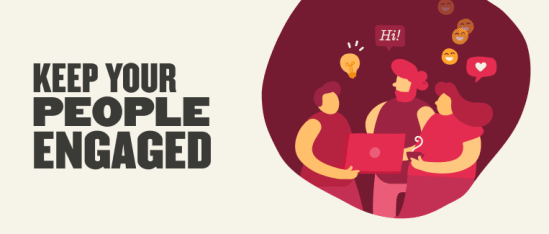Employee engagement is a key part of any HR strategy. But how effective has employee engagement been in addressing modern companies’ biggest challenges? Even with all the hype about improving employee engagement, 16 percent of professionals “were actively disengaged in their work and workplace” in 2021, according to a Gallup poll, and the percentage of engaged employees fell for the first time in more than ten years. Is all this chatter about engagement just a lot of sizzle with little substance?
It turns out that beyond its feel-good appeal and buzz-worthiness, employee engagement is changing the world of work as we know it. Let’s take a look at four ways employee engagement impacts our work lives and productivity.
1. Engagement helps companies win talent
Over the last two years, creating a workplace culture where people feel connected to their colleagues and the company’s mission, vision, and values has become top priority for employers and their people. This is because of the skills shortage companies are facing now, combined with the rapidly evolving expectations of their best and brightest talent. As a result, companies that prioritize a culture of active, continuous engagement are much more likely to increase their value and keep and attract top talent.
Keeping your workforce engaged is critical, especially with so many people working from home in fully remote or hybrid work structures. But how? You can pool together your people’s mutual interests and hobbies. This can help you create online clubs and digital hangouts where your teams can bond, have fun, and keep engagement levels high. It’s also the perfect time and place to engage your people and bring them together in one virtual space. And guess what? Engagement and employee retention both increase when your people experience a combination of work and play.
2. Engagement creates happier workplaces
It may surprise you, but most people don’t leave their jobs in search of a higher salary. According to research we conducted with Fiverr, people are leaving their jobs in search of more flexibility over anything else.
In today’s economy, productivity relies on the unique genius of highly skilled professionals who refuse to let companies treat them like cogs in a machine. Sure, fair compensation matters—but it’s not what fuels top talent in the modern workforce. An engaged company—one where team leaders recognize, acknowledge, and reward the efforts of their people—goes a long way towards boosting people’s sense of workplace satisfaction.
Take advantage of tech tools that call your people out for a job well done. Sending a Shoutout or a company-wide Kudos blast that acknowledges your people for their hard work and accomplishments is proven to increase engagement, whether your people are working on-site or remotely.
3. Engagement is forcing HR to leverage technology like never before
Engagement depends on people’s connections with each other. In today’s world of dispersed teams, human connection relies increasingly on connectivity through tech. With an increasing number of people working remotely, HR teams are embracing different kinds of tech to boost collaboration and overall connectivity in a world that demands more flexibility than ever.
HR teams that dive deep into KPIs, employee experience platforms, and other tech tools lead engagement-driven companies. HR can quickly test new ideas and engagement activities with people data to see what’s working and what isn’t.
Integrated collaboration tools are the perfect way to keep your people connected and communicating. For example, HiBob’s integrations with Slack, MS Teams, and other communication platforms make transparency possible, increasing engagement rates and improving collaborative project workflows.
Recommended For Further Reading
4. Engagement is erasing the 8-hour workday
Companies considered anyone who dutifully completed a set of predefined tasks productive in the past. But for modern companies to thrive, they need knowledge workers who excel in critical thinking, problem-solving, and creativity to devise novel solutions. However, research shows that the eight-hour workday reduces people’s productivity and prevents them from getting into that all-important creative flow. So if longer hours don’t matter, what does? Engagement. Truly engaged team members are allowed to innovate, take creative risks, and are encouraged to exercise their brains with deep learning while at work.
To keep your people engaged, whether they’re remote or at the office, be flexible with your home-office hours, and understand that everyone works at their own pace and on their own schedule. Instead, implement deep learning by assigning to-dos and projects that require your people to get creative at any hour of the night—or morning.
Account for the bigger picture: measure engagement vs. disengagement
Most companies understand the advantages that come with an engaged workforce. Yet the disengagement epidemic persists and adversely affects the bottom line to the tune of $8.1 trillion in lost productivity. What’s holding many companies back is a myopic focus on measuring engagement. But that’s only the first step.
To catalyze the creation of a more motivated workforce, improving engagement should be top of mind. And, companies that take that extra step, from just gauging to serious action, are finding that engagement is having a profoundly positive impact on their world of work.


